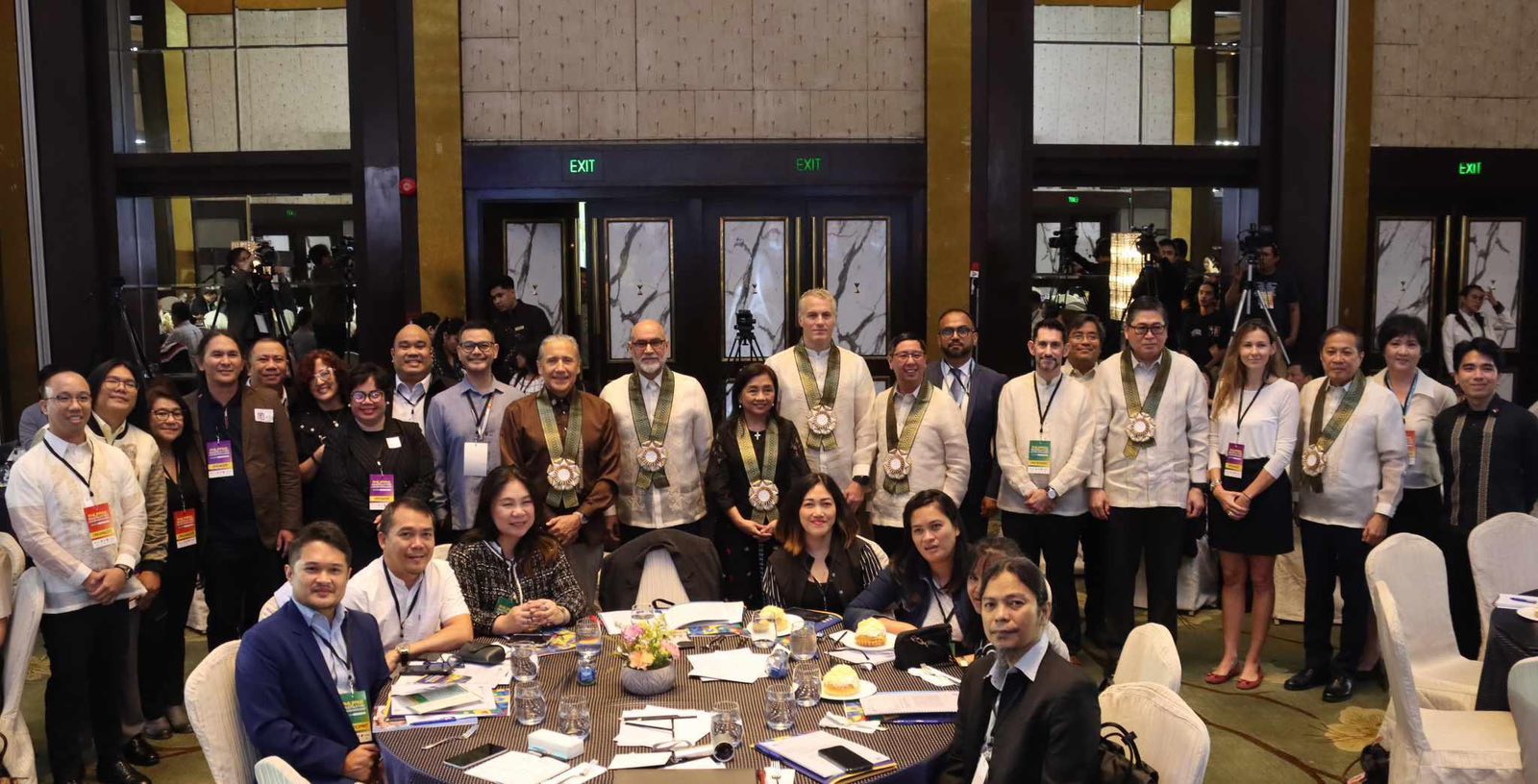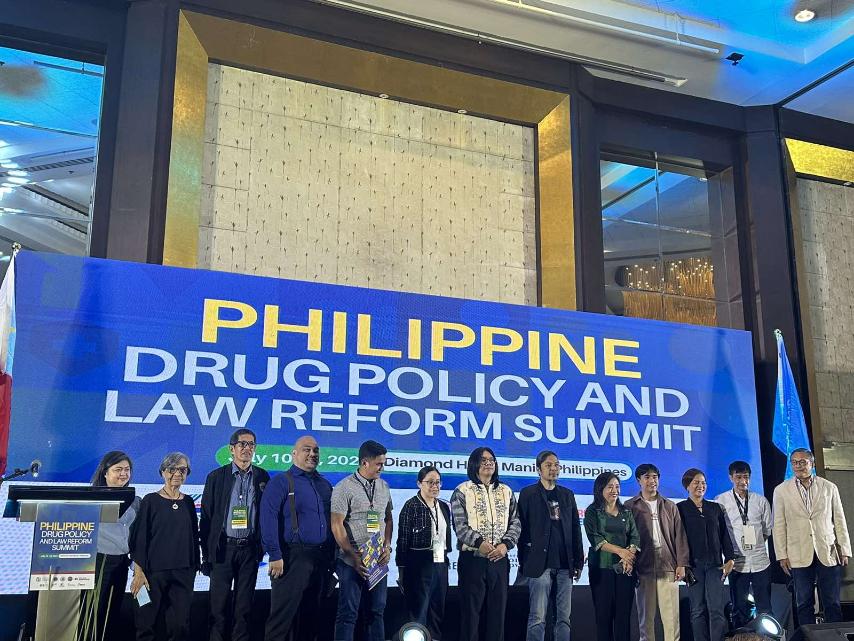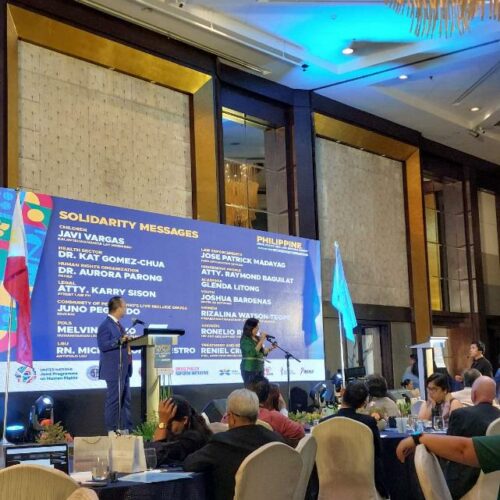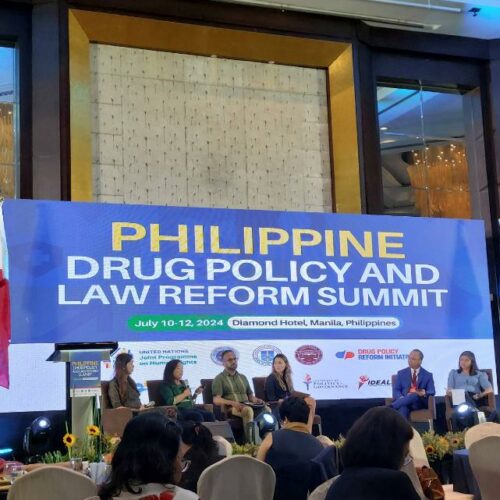UP College of Law and UP Institute of Human Rights Participate in the First Philippine Drug Policy and Law Reform Summit with the Philippine Government and United Nations
The Drug Policy and Law Reform Summit (“Summit”) was held from July 10 to 12, 2024 which was synergized by the steadfast support from various sectors, organizations, and government agencies.
The UP College of Law is the official academic partner of the project, while the UP Institute of Human Rights spearheaded the dialogues, submission of position papers, and pre-summit event. Prof. Glenda Litong and Atty. Raymond Baguilat, with their research team, drafted the Rapporteur’s Outcome Report which became the primary reference of the discussions for the continuing dialogue.
During Day 1 of the Summit, Prof. Litong delivered the Rapporteur’s Outcome Report, wherein she presented an overview of the history of the Drug War which prompted the necessity of a nuanced drug policy. This is where the UN Joint Programme for the Protection and Promotion of Human Rights in the Philippines (“UN Joint Programme”), a three-year collaboration between the Philippine Government and the United Nations, came into the picture, to implement Human Rights Council (HRC) Resolution 45/33.
In line with the UN Joint Programme, Prof. Litong emphasized the conduct of numerous dialogues, where stakeholders were encouraged to share their lived experiences, and submission of position papers, to elicit local knowledge and experiences, and best practices from various stakeholders to come up with a holistic, human rights-based, public health-driven, and more importantly, compassionate drug policies. She also explained the methodology in processing and analyzing the data from these dialogues and position papers following the principle of knowledge translation, and the creation of a database to store the gathered evidence, which will be made accessible to the public. Included in the Report were the safeguards employed by her team to ensure the integrity and transparency of data processing and analysis, the capacity building sessions undertaken to orient and train the documenters and facilitators, the limitations encountered in gathering, processing, and analyzing data, as well as the profiles of dialogue participants and position paper authors.
Prof. Litong comprehensively reported the experiences and recommendations gathered from the ten (10) regional and twenty-three (23) dialogues conducted and twenty-seven (27) position papers submitted. She concluded her presentation of the report with the finding that the marginalized are at the receiving end of the Duterte Administration’s “War on Drugs”, who are unable to secure their rights, and ending the War on Drugs in favor of a rights-based approach that treats drug use as a health issue is critical to effectively address the drug concern.
Day 2 of the Summit focused on the discussions of the foundational concepts and settings-based reform. Through plenary sessions on Justice and Health Sectoral Collaboration and breakout rooms for Dialogues on Settings-Based Policy and Law Reform.
Finally, on Day 3, Prof. Baguilat joined Dr. Yarcia, National Programme Officer of the UN Office of Drugs, in moderating the plenary session on the Presentations on the Settings-Based Drug Policy Reform Recommendations based on the breakout groups the other day. Afterwhich, the panel consisting of key officials in the government, such as the Department of Interior and Local Government (DILG), Department of Health (DOH), Department of Social Welfare and Development (DSWD), Department of Justice (DOJ) Undersecretary Jesse Andres, Dangerous Drugs Board (DDB) Undersecretary Earl Saavedra, and Representatives from the Congress and the Senate, including Sen. Risa Hontiveros, each responded to said reports.
In another plenary session, Prof. Litong joined as one of the panelists on the discussion of Intersectionalities and Integration of Drug Policy Responses under a Human Rights Framework. The session was moderated by Dr. Lee Yarcia and Atty. Karry Sison. The session started with a discourse on the most critical areas of drug policy reform needed in the Philippines. Meanwhile, Prof. Litong was specifically asked on the importance of meaningful participation in crafting drug policies and the barriers and solutions thereto. Prof. Litong made sure to inject the issues on marginalization, vulnerability, and the criminal justice system.
At the end of the Day 3, the UP College of Law, as representative of the academe, delivered its Solidarity Message along with other sectoral representatives. The message delved on the commitment to working closely with communities, civil society, and policymakers, and encouraging public participation and engagement in its work to ensure that research translates into practical, impactful policy changes. The University of the Philippines Law Complex likewise aims to contribute to the development of compassionate and effective drug policies that promote human dignity and justice for all.
Lastly, the University of the Philippines Law Complex extends its warmest congratulations to the success of the Philippine Drug Policy and Law Reform Summit, most especially the Technical Working Group and the summit organizers. We are also grateful for the full support of the College of Law Dean, Atty. Darlene Marie B. Berberabe and Director of the UP Law Institute of Human Rights, Prof. Elizabeth Aguiling-Pangalangan.











































































































 on the upper right corner to select a video.
on the upper right corner to select a video.